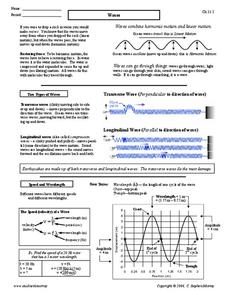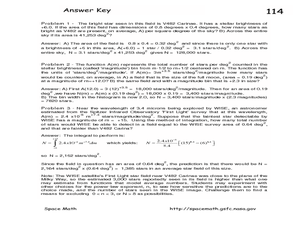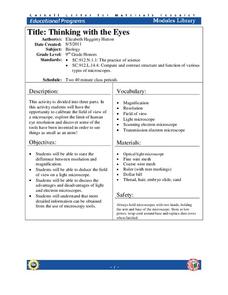McGraw Hill
The Bohr Atom
Elements don't have fingers, but they have fingerprints! An interactive simulation gives young scientists the opportunity to study orbital changes of an atom and the corresponding spectrum reading. They realize how each atom has a...
Curated OER
Fermi Observatory Measures the Lumps in Space
In this gamma-ray activity, students read about the Fermi Gamma-ray Observatory and how it measures the invisible lumps in space. Students solve 3 problems using an equation to determine the time that gamma-rays travel in space and the...
Curated OER
Starlight, Star Heat
In this stars worksheet, students read how astronomers calculate the temperature of a star by measuring its color. Students use a chart showing star temperatures and colors to complete 3 short answer questions.
Curated OER
Characteristics of Waves
In this characteristics of waves worksheet, students answer 9 questions about the structure of waves, the types of waves and the components of waves. They describe the frequency of a wave and calculate the velocity and frequency of waves.
Curated OER
The Plasmasphere
In this plasmasphere worksheet, students read about the dilute region of gases 10,000 kilometers above the Earth where atoms are ionized. Students use a photograph taken by the IMAGE EUV instrument to answer 3 questions about the...
Curated OER
The Lighter Side of Color
Pupils explore light and color, including how colors are mixed to produce new colors, how light is filtered, and how light is reflected off of surfaces. They read materials provided, complete worksheets, and complete hands-on activities.
Curated OER
Waves
In this waves worksheet, students read about the different types of waves and how the speed of waves is calculated. Then students complete 5 matching, 8 fill in the blank, and 9 short answer questions.
Curated OER
Energy Motion in the Ocean
Learners explore the wave energy that is generated and transferred in the ocean. Through the use video and the Internet, students explore the aspects of a wave and how its energy affects the ecology of the seashore.
Curated OER
F(x)g(x): A Tale of Two Functions
In this graphing functions worksheet, learners solve four problems where they graph given functions, find the sum related to the area under the curve and determine an integral.
Curated OER
Exploring Power-Law Functions Using WISE Data!
In this power-law functions activity, learners solve 3 problems using data from the Wide-field Infrared Survey Experiment in the constellation Carina. Students use a photograph to determine the number of stars as bright as the brightest...
Curated OER
Exploring Solar Beads
Learners discover solar energy beads and learn about ultraviolet light. In this solar energy lesson, students learn about solar energy beads, ultraviolet light, and UV radiation dangers. Learners experiment with the beads to identify.
Curated OER
AP: Chapter 10: Photosynthesis
AP biologists or college-level botanists consider in-depth details of the photosynthetic process. They examine the structures in a leaf and the roles that they play. They label neat and colorful diagrams of photosystems and electron...
Curated OER
Spectral Lines
Slides and slides of emission spectra bring this topic to light for your physics class! Exited electrons returning to lower energy levels is offered as the cause of emission spectra. In summary, viewers learn that we can determine the...
Curated OER
Typical Numeric Questions for Physics I - Atomic Spectra
Seven practice problems are presented to physics pros in this assignment. Given the wavelengths, they perform computations for emission spectra. This brief instructional activity makes an appropriate pop quiz.
Curated OER
Reflection and Refraction
What is a prism? A place for light waves that commit minor refractions! The thorough resource includes three hands-on investigations covering light reflection and refraction; mirrors, lenses, and images; and optical systems. Subject...
Cornell University
Thinking with the Eyes
Objects are larger (or smaller) than they appear! Scholars use a laboratory investigation to explore the difference between resolution and magnification. The activity allows them to calculate the size of the field of view of their light...
Curated OER
Emission Spectra
These attractive slides explain the basics of the electromagnetic spectrum and then display the emission spectra for a number of elements. argon, helium, hydrogen, xenon, neon and krypton are shown here and two graphs showing log scale...
Curated OER
Physical Science: Dying for a Tan?
Students assess how much harm UV radiation can have on your skin and how much protection is provided by sunblock, sunglasses and clothing. They experiment with UV index numbers and the amount of exposure risk of skin damage for any given...
Curated OER
Lesson- Colors of Stars
Student describes what happens to the color of a stove burner or a coal as it gets hotter. They use the applet to determine what range of temperatures range give you a red light, what range of temperatures would give you a white light,...
Curated OER
Spectrophotometry Lab
Pupils use a machine called a spectrophotometer to determine how much light is absorbed by certain substances. Students record the absorbance and the % of light transmitted for different color solutions, graph their results, and then...
Curated OER
Electrons and Atoms
For this atoms worksheet, students determine the velocity, wavelength, power, and frequency of given atoms. Student describe wave-particle duality and give the principle and angular quantum numbers for given orbitals. This worksheet has...
Curated OER
Gamma Ray Bursts
Young scholars study an article on Gamma Rays. For this investigative lesson students study the energy and wavelengths of gamma rays and the theories behind them.
Curated OER
Honors Chemistry I
In this honor chemistry I worksheet, students use all available resources to answer each question given. Students apply their knowledge of light, quantum theory of light, Bohr's model, photoelectric theory.
Curated OER
Physical Optics: The Wave Nature of Light
Students are introduced to the wave nature of light. In groups, they discuss Young's experiment and how diffraction and interference demonstrate the wave nature of light. Using examples, they show constructive and destructive...























